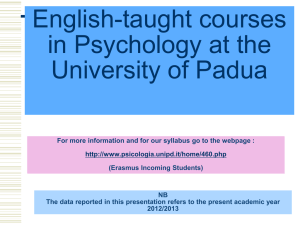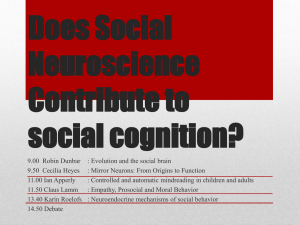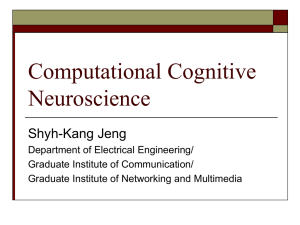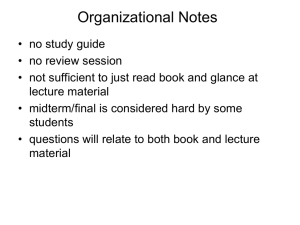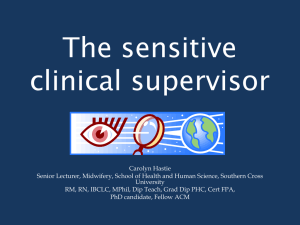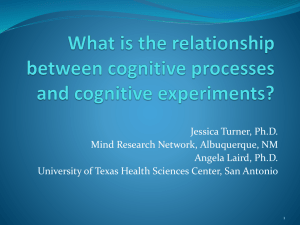Oxford Cognitive Neuroscience
advertisement
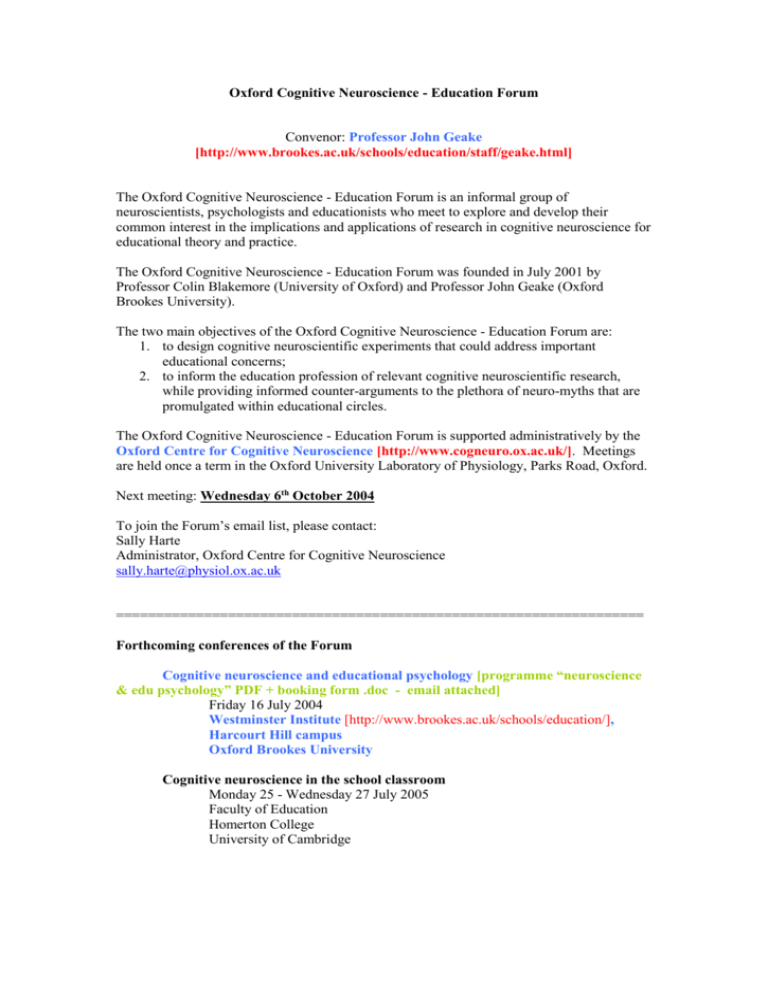
Oxford Cognitive Neuroscience - Education Forum Convenor: Professor John Geake [http://www.brookes.ac.uk/schools/education/staff/geake.html] The Oxford Cognitive Neuroscience - Education Forum is an informal group of neuroscientists, psychologists and educationists who meet to explore and develop their common interest in the implications and applications of research in cognitive neuroscience for educational theory and practice. The Oxford Cognitive Neuroscience - Education Forum was founded in July 2001 by Professor Colin Blakemore (University of Oxford) and Professor John Geake (Oxford Brookes University). The two main objectives of the Oxford Cognitive Neuroscience - Education Forum are: 1. to design cognitive neuroscientific experiments that could address important educational concerns; 2. to inform the education profession of relevant cognitive neuroscientific research, while providing informed counter-arguments to the plethora of neuro-myths that are promulgated within educational circles. The Oxford Cognitive Neuroscience - Education Forum is supported administratively by the Oxford Centre for Cognitive Neuroscience [http://www.cogneuro.ox.ac.uk/]. Meetings are held once a term in the Oxford University Laboratory of Physiology, Parks Road, Oxford. Next meeting: Wednesday 6th October 2004 To join the Forum’s email list, please contact: Sally Harte Administrator, Oxford Centre for Cognitive Neuroscience sally.harte@physiol.ox.ac.uk ================================================================== Forthcoming conferences of the Forum Cognitive neuroscience and educational psychology [programme “neuroscience & edu psychology” PDF + booking form .doc - email attached] Friday 16 July 2004 Westminster Institute [http://www.brookes.ac.uk/schools/education/], Harcourt Hill campus Oxford Brookes University Cognitive neuroscience in the school classroom Monday 25 - Wednesday 27 July 2005 Faculty of Education Homerton College University of Cambridge Publications on educational neuroscience Hansen, P. C., Azzopardi, P., Matthews, P. M. & Geake, J. G. (2003). Neural Correlates of Creative Intelligence: An Fmri Study of Fluid Analogies. Poster at The Society for Neuroscience Annual Conference, New Orleans, 8-12 November. [PDF Geake SfN attached] Geake, J. G., & Cooper, P. W. (2003). Implications of cognitive neuroscience for education. Westminster Studies in Education, 26(10), 7-20. [ attached] Abstract: Research into the functioning of the human brain, particularly during the past decade, has greatly enhanced our understanding of cognitive behaviours which are fundamental to education: learning, memory, intelligence, emotion. Here we argue the case that research findings from cognitive neuroscience hold implications for educational practice. In doing so we advance a bio-psycho-social position that welcomes multi-disciplinary perspectives on current educational challenges. We provide some examples of research implications which support conventional pedagogic wisdom, and others which are novel and perhaps counter-intuitive. As an example, we take a model of adaptive plasticity that relies on stimulus reinforcement and examine possible implications for pedagogy and curriculum depth. In doing so, we reject some popular but over-simplistic applications of neuroscience to education. In sum, the education profession could benefit from embracing rather than ignoring cognitive neuroscience. Moreover, educationists should be actively contributing to the research agenda of future brain research. Geake, J. G. (2003). Adapting Middle Level educational practices to current research on brain functioning. Journal of the New England League of Middle Schools, 15(2), 6-12. [doc file attached] Abstract: The 1990’s were labelled, “The decade of the brain” by a U.S. Presidential Committee (Rennie, 2002). Certainly more has been learned about brain functioning in this past decade than in the entire history of human enquiry. However, unfortunately for those hoping for immediate research outcomes, which could be used for political solutions to social problems, the more that is understood about the brain, the more of its mystery is revealed. Are there new insights about brain functioning, which can be applied to education? Does a better understanding of how our students’ brains function help us in our classroom work as teachers? This article outlines a positive response to these questions by considering how some vexatious educational issues could be informed by viewing the research evidence including studies at Oxford University in Great Britain, on how brains manage intelligence. Nature Neuroscience 7(1) January 2004. Editorial: Better reading through brain research [Nneuro_ed.pdf attached] Usha Goswami (2004). Neuroscience and education. British Journal of Educational Psychology 74(1), 1-14. Abstract: Neuroscience is a relatively new discipline encompassing neurology, psychology and biology. It has made great strides in the last 100 years, during which many aspects of the physiology, biochemistry, pharmacology and structure of the vertebrate brain have been understood. Understanding of some of the basic perceptual, cognitive, attentional, emotional and mnemonic functions is also making progress, particularly since the advent of the cognitive neurosciences, which focus specifically on understanding higher level processes of cognition via imaging technology. Neuroimaging has enabled scientists to study the human brain at work in vivo, deepening our understanding of the very complex processes underpinning speech and language, thinking and reasoning, reading and mathematics. It seems timely, therefore, to consider how we might implement our increased understanding of brain development and brain function to explore educational questions. © The British Psychological Society 2004 Byrnes, J. P. & Fox, N.A. (1998). The educational relevance of research in cognitive neuroscience. Educational Psychology Review,10, 297-342. Abstract: The benefits of incorporating finding s from cognitive neuroscience into the field of educational psychology are considered. The first section begins with arguments against the idea that one can ignore the brain when positing a model of student learning or motivation. The second section describes limitations in the methods used to reveal brain-cognition relations. In the third section, properties of the brain and brain development are described. The fourth section summarizes the cognit9ive neuroscience research on attention, memory, reading and math. Finally, areas of future research in cognitive neuroscience are suggested that would help answer important questions about individual differences and developmental differences in student learning. O'Boyle, M.W. & Gill, H.S. (1998). On the relevance of research findings in cognitive neuroscience to educational practice. Educational Psychology Review,10, 397-40 Abstract: In their target article, Byrnes and Fox argue that many of the recent findings from the field of cognitive neuroscience have particular importance for education. In our commentary, we lend support to their contention by reporting on some of our work that has potential relevance to the proposed interface between cognitive neuroscience and education. Specifically, we discuss the findings from several studies investigating the neuropsychology of intellectual giftedness, and sex differences in the brain, each of which suggest a unique functional organization that differentiates gifted from average ability adolescents, as well as males from females. We further propose that the translation of cognitive neuroscience findings into specialized classroom instructional methods which captialize on the plasticity of the brain, as well as the apparent individual differences in its functional organization, may be the most significant challenge facing those in the front-lines of educational practice. Other centres of neuroscience and education Centre for Neuroscience in Education Faculty of Education University of Cambridge [http://www.educ.cam.ac.uk/] Crucible Group, UWE Bristol, Chair Sir Christopher Ball [no link] Talaris Institute, Seattle [http://www.talaris.org/index.htm] University of Washington, Seattle [http://faculty.washington.edu/chudler/neurok.html] Scientific Learning Corporation [http://www.scilearn.com/] OECD Centre for the Transfer of Neuroscience and Learning, University of Ulm [http://www.oecd.org/topic/0,2686,en_2649_14935397_1_1_1_1_37455,00.html] Presentation files from previous conferences BERA Symposium 2002 abstracts [BERA Symposium Abstracts_Brain_Geake attached] Archived notes of past meetings of the Forum [attached 9 doc files of Forum meeting notes from July 01 to April 04] 2001 July 2002 January March June December 2003 April July December 2004 April
